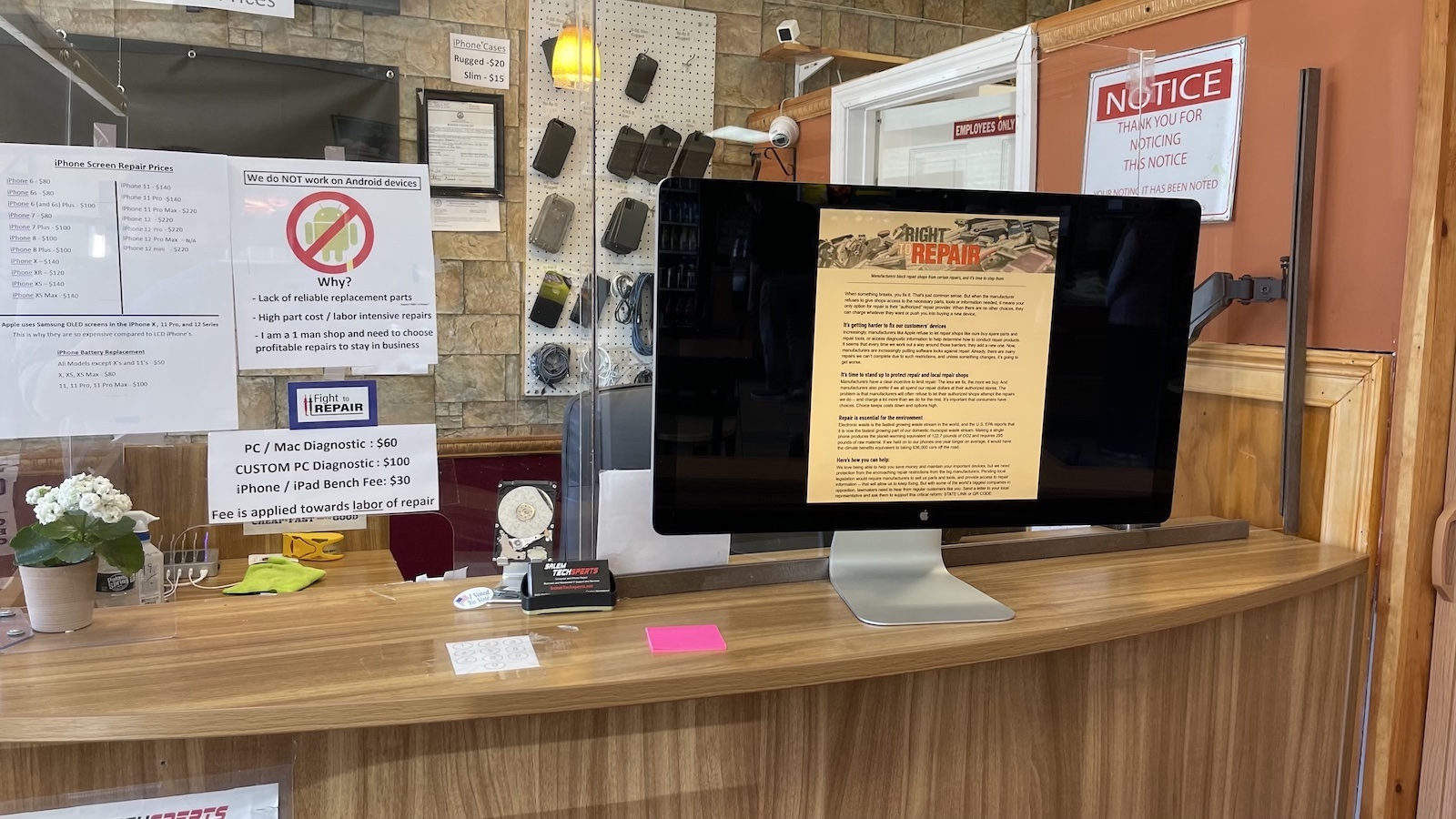
Madison Dennis
Former New Economy, Associate, PIRG
Nearly half of surveyed repairers fear closing, so they’re mobilizing support for new laws
Former New Economy, Associate, PIRG
The legislative and legal battle over who can fix modern gadgets pits manufacturing Goliaths against a plucky army of Davids, including a loose regiment of local independent repair shops.
Shop owners have been mobilizing their customers and calling on their fellow shop owners to help overcome manufacturer opposition and enact reforms — and it’s working. Repair voices including Louis Rossman (repair shop owner and YouTube host), as well as Repair.org, were critical to the recent victory in New York, where the legislature passed the nation’s first Right to Repair bill for electronics.
Right to Repair legislation, under debate in statehouses across the country, would require manufacturers to provide access to parts and service information necessary to repair products. According to the National Repair Shop Survey by U.S. PIRG and iFixit, 45% of the 235 surveyed repair shops worry they might have to close their doors if Right to Repair does not become law.
While a critical issue for small businesses, progress has been difficult in the face of some of the largest companies in the world, including Apple, Google and John Deere, who have lobbied extensively to quash these bills. The local mom and pop businesses that fix our electronics have been critical voices educating the media and lawmakers about why it’s so hard to fix our stuff. Here are two other examples of repair shops that are leveraging their deep relationships with their local communities to push for change.

In Washington, Bellingham’s FiXCO makes sure its customers know what’s at stake
Mitch Kramer has been running FiXCO since 2012. Word has gotten around Bellingham, a small city north of Seattle: If something breaks, take it to Mitch.
However, Mitch’s job is getting harder as manufacturers lock down access to repair materials and software. Kramer has watched more than 10 cell phone repair shops open in Bellingham, only to close down. Kramer’s FiXCO is the last local shop left.
Worried about his future, Kramer sat down for coffee with his then-state Representative, Jeff Morris, to discuss Right to Repair, and Rep. Morris agreed to introduce legislation. Kramer discovered that the national Repair Association (Repair.org) had been trying to get similar legislation introduced in Washington state, but had not yet recruited a sponsor. When Kramer’s local repair shop stood up and fought for its business, that bill was finally put forward. But when manufacturers intensely opposed the legislation, Kramer started a new habit: making sure his customers know their local repair options are in danger of extinction.
Kramer, unlike the local manufacturer-certified repair shop, performs most of his repairs in 30 minutes, so most of his customers hang out to watch him work.
“While they wait, I start conversations and create a personal connection,” Kramer said. “We normally start off by talking about their broken device. So I make sure to bring up Right to Repair with almost every customer. No matter their background or political beliefs, there’s this one subject where we can almost always agree. People want to fix their stuff.”
Kramer has not only seen the impact of these conversations on the consumer, but also watched the message travel throughout his community. When he first started bringing up Right to Repair, almost no one knew what he was talking about. He now estimates that more than half of his customers know about, and support, the Right to Repair.
“When my customers’ devices break, their world often stops. I find the work I do to be very rewarding because it allows me to help my community get back up and running again,” Kramer said. “However, if we don’t get Right to Repair laws on the books and manufacturers continue to make it as difficult as possible to repair these devices, businesses like mine will be gone. I try to make sure my customers know that if they don’t speak up, I won’t be here.”
Kramer is hoping to rally more shops to mobilize their customers to overcome manufacturer objections to Right to Repair.

In Massachusetts, Salem Techsperts uses posters and flyers to drive immediate action

Waiting area with Right to Repair slideshow in Salem Techspert. Photo from Andy Harding.
Andy Harding established Salem Techsperts in 2015 inside a local Subway sandwich outlet. Harding first heard about Right to Repair reforms when Massachusetts passed automobile Right to Repair legislation in 2012. It just made sense to him that we deserve to have the same rights with our digital devices.
Harding advocates for the Right to Repair with visuals covering his shop. In the waiting area, your seat is adorned with a “War on Repair” magazine. The walls and windows are covered in posters. There is even a Right to Repair slideshow playing on the desk. Harding also provides concrete ways for his customers to take action. Many of his Right to Repair materials, even his invoices, include a link which directs customers to a petition or contact information for their local representative. He encourages his customers to make a quick call or send over an email, because this outreach could be the difference between his shop continuing to thrive or having to shut his doors.
But Harding knows he can’t do it alone.
“We need more repair shops to start talking to their customers about Right to Repair, because most of the public doesn’t know about the issue until they are in our shop with a broken phone screen and they feel the impact on their wallets,” he said. “I’m approaching them from every angle,” said Harding. “If you’re getting subs at Subway or just walking by my store, you see the Right to Repair. And if you come inside to get your device fixed, you definitely see it. My hope is to plant the seed and get people talking about it.”


Right to Repair slideshow in Salem Techspert waiting area. Photo from Andy Harding.


Action posters outside Salem Techspert shop. Photo from Andy Harding.

To advance Right to Repair, we need local repair shops to become leaders.
Right to Repair is common sense for most of us: If we own something, we should be able to fix it. But if we are going to take on the lobbying power of the large manufacturers, we need more repair shop owners to become advocates like Harding and Kramer.
Whether it be taping up a Right to Repair poster, calling your local representative, or just starting a conversation with a customer, the repair community has the power to connect with its customers and show them that if they want to keep fixing their stuff and supporting the small businesses on Main Street, they need to speak up for the Right to Repair.
Former New Economy, Associate, PIRG
